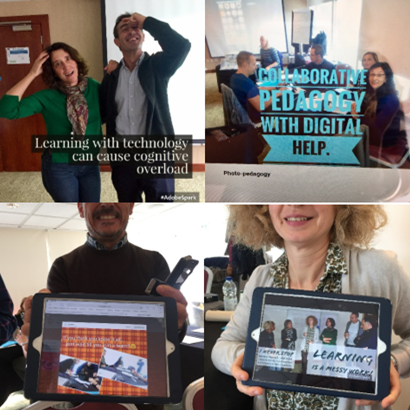A collection of ideas and tasks for language (and other) teachers outlining the ways in which mobile devices can help with learner reflection can be found in the British Council’s Voices Magazine article (dated 18 July 2016).
Reflection activities supported by mobile devices fall into several categories, as outlined below.
Photo-capture of learning
To help scaffold reflection, at various intervals throughout training activities, ask participants to take photos of what they are doing at that moment, or, with permission, take some yourself to share with the group. Use these to help prompt reflection, combined with the tasks below.
Prompts
Ask teachers to choose from the following sentence stems/prompts and, in a silent space (perhaps choosing to move outside the training room) note down thoughts, questions and reflections, e.g. What I discovered about myself as a learner…. What I still have questions about… I could/couldn’t use this kind of activity in my class because…I could adapt this activity to use in class by…..
Analogue Capture
A reflective dictation allows time for participants to respond to trainer prompts in drawing or writing with paper and pencils. This change of tool use is important, and teachers need to see that ‘analogue’ tools are equally important in the classroom; it is the task that drives the learning. Ask participants to answer questions by directing them to reflect on the previous day’s work.
One of the questions used here asked participants to state their beliefs about learning spaces in the light of the training sessions, and write a statement. Examples from primary school teachers include:
‘I believe that free access to move around is vital. Everything else I can do without. I’ll make the space. Groups can sit/stand/lie everywhere’ (Marie)
‘Learning spaces should be designed so pupils can make their own choices’ (Tom)
‘I believe that any space can be a learning space, but the teacher needs a good plan and structure for the use of the space. Learning about picnics is best done by (having) a picnic. Outdoor is just as good as indoor.’ (Annette)
Asking participants to write a ‘burning question’ helps feed their developmental priorities into subsequent sessions, and raises uncertainties and fears surrounding the use of mobile devices with very young learners. Responses informed subsequent group discussion that the trainer recorded, with their permission, to use as a guide to developmental priorities. In modelling this, the trainer shows one of the ways in which a teacher’s role is changing. Teacher educators need to be more responsive, working on emerging language and learning needs, rather than planning in advance for a ‘one-size fits all’ training session to be ‘delivered’. The same could, and maybe should, be said of language teaching.
Digital Capture
Ask teachers to work in small groups, and choose one or two of their reflections to share. Using an app that can combine text with photos (e.g. Adobe spark post, Typorama, photogrid) teachers can choose one reflection to combine with the photo that prompted it, or take a photo to illustrate it (see Figure 4.5). The resulting creations can be shared and discussed by moving around the room with mobile devices, seeking feedback on the combinations of text, colour and image. The most important thing, which is evident in the examples below, is to put the emphasis on the fun that creating and working in groups can bring. Those teachers with good digital technical skills can aid others in fine-tuning their work.

Gathering whole group feedback from reflection
Modelling mobile educator practice is important for trainers. Recording feedback from discussion activities from each group and re-formulating, and summarising it, allowing participants the chance to listen to the content live twice, and revisit it to collect examples of more, or less formal ways to express ideas.
This is an example of group reflection from a mainly monolingual group of subject teachers, with the English language teacher in each group reporting back on the L1 discussion. Similarly, learners can share reflections simply using voice memo or audio recording features available on their mobile devices: https://audioboom.com/posts/5155296-touch-screen-implicstions-ipswich-isp?playlist_direction=forward&t=0
You can listen to teachers discuss issues arising from their use of digital tools two years after a MALL CPD course that took place on board a ship cruising from Finland to Sweden and back (the ultimate mobile learning venue!) here: https://audioboom.com/posts/4915169-2-years-on-reflections-from-finland
